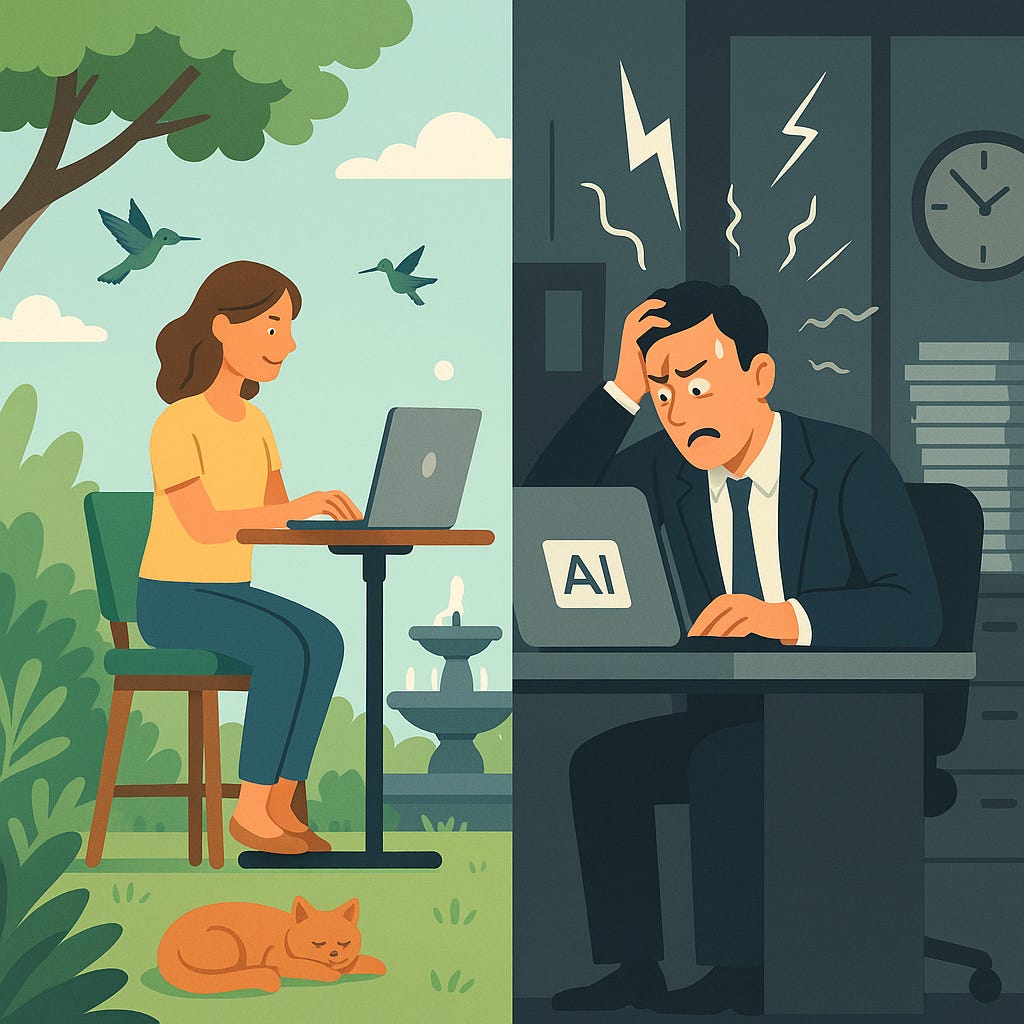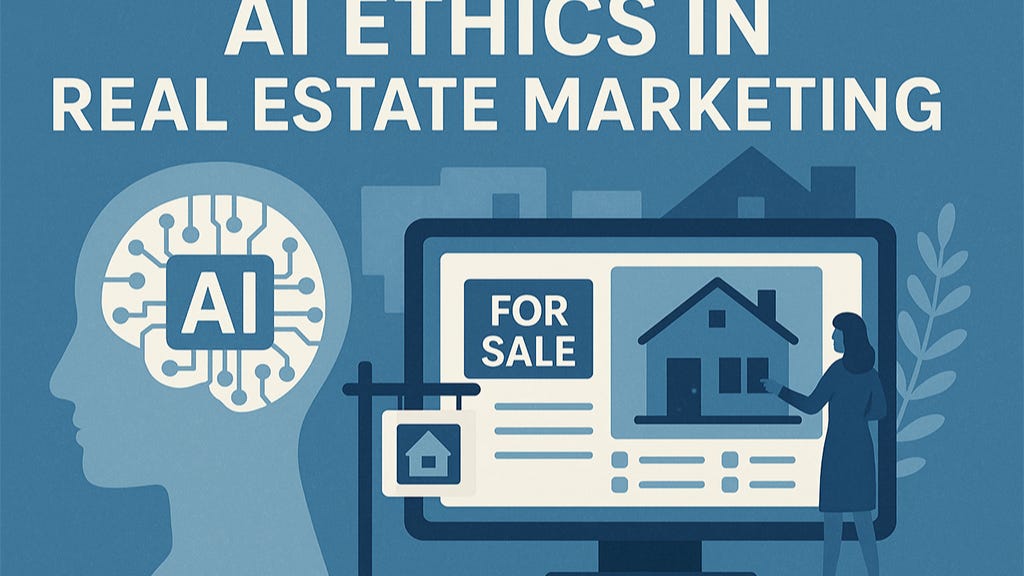AI in the Workplace: More Time or More Stress?
Whether AI lightens employee workloads or adds more stress depends on leadership.
Liza Adams, CMO of GrowthPath Partners, is the first person I turn to for anything related to enterprise AI. Talk about a forward thinker, Liza is.
She recently shared her experiences with AI in a LinkedIn post, highlighting its benefits and potential pitfalls.
While AI can alleviate the stress of starting tasks from scratch, it also risks increasing workloads and expectations. This phenomenon, known as "technostress," is becoming increasingly prevalent in modern workplaces.
TL;DR
AI can lighten your workload, but it might quietly add to your stress if you're not careful.
Inspired by Liza’s post, this issue explores the dual reality of AI in the workplace: how it boosts creativity and efficiency, raises expectations, and risks burnout.
We look at recent data on AI-induced technostress, offer practical ways to maintain balance, and share friendly reflections on using AI to think better, not just work faster.
Workleap sponsors this Issue of AI Workplace Ethics & Wellness.
Thriving in an AI-driven workplace takes more than just tech; it takes tools that support people. Workleap understands this.
Workleap is an AI-powered employee experience platform that helps organizations build people-first, high-performing workplaces. Their human-first approach to employee experience aligns perfectly with our mission: helping teams navigate AI, reduce technostress, and do their best work.
Book a free demo and take advantage of their 7-day free trial.
Deep Dive
In her post, Liza wrote:
“A Harvard study says people who use AI are less stressed. I believe it and I’ve felt it. The work gets lighter, you move faster, and you’re not staring at a blank screen as often.”
Liza's insights resonate with many of us who are embracing AI tools to enhance productivity and creativity. However, as we learn the ropes, it's essential to consider the broader implications of AI on workplace stress and wellbeing.
The Promise of AI: Efficiency and Creativity
Liza highlights the benefits of AI in her daily routines:
“I use AI not just in my work, but in my life. I’ve used it to plan family vacation adventures, help my daughter evaluate colleges, choose the best board games for teens, and more.”
These applications showcase AI's potential to streamline tasks, foster creativity, and free up time for strategic thinking. Indeed, studies have shown that exposure to nature and incorporating movement into our routines can boost creativity and reduce stress.
“Being surrounded by nature is making a real difference in both stress and creativity,” Liza notes.
The Reality Check: Technostress and Increased Workloads
While AI offers numerous advantages, it's crucial to acknowledge its challenges.
A study by Upwork found that 77% of employees using AI reported an increase in their workload, contrary to expectations of efficiency gains. This phenomenon, often called "technostress," encompasses the stress and anxiety associated with adopting new technologies.
The American Psychological Association's 2023 Work in America survey revealed that 38% of workers are concerned that AI might render some or all of their job duties obsolete. This apprehension can lead to increased stress and decreased job satisfaction.
Two-thirds of employees concerned about AI reported regular workplace stress or burnout.
The Balance: Mindful Integration of AI
Remember the scene in The Karate Kid when Mr. Miyagi has Daniel stand precariously on the bow of the small boat, trying to teach him the value of balance?
In the same way, Liza wisely advises companies to focus on achieving balance and not allow the initial relief provided by AI to lead to increased expectations:
“That relief might be temporary. History shows that when we gain new capabilities, we raise the bar. We don’t just enjoy the space, we fill it.”
Her observation underscores the importance of mindfully integrating AI into our workflows. Without intentional boundaries, the efficiencies gained can quickly be overshadowed by heightened expectations and workloads.
Research indicates that technostress can lead to adverse physical and psychological effects, as well as work-related problems such as burnout and reduced productivity. Therefore, it's essential to implement strategies that mitigate these risks.
Strategies for Managing AI Technostress
To harness the benefits of AI while minimizing technostress, consider the following approaches:
Set Clear Boundaries: Define specific times for using AI tools to prevent constant connectivity and allow for mental breaks.
Promote Digital Literacy: Offer training and resources to enable employees to utilize AI tools, thereby reducing frustration and anxiety effectively.
Encourage Open Dialogue: Foster an environment where employees can express concerns about AI integration and contribute to decision-making processes.
Monitor Workloads: Regularly assess workloads to ensure that AI tools genuinely alleviate tasks rather than add to them.
Support Wellbeing Initiatives: Incorporate wellness programs that address the psychological impacts of technostress, such as mindfulness training and access to mental health resources.
Embrace AI with Awareness
As Liza Adams eloquently illustrates, AI has immense potential to enhance our work and personal lives. However, it's imperative to approach its integration with awareness and intentionality.
By acknowledging the challenges and implementing strategies to mitigate technostress, we can create a balanced environment where AI is a tool for empowerment rather than a source of stress.
As Liza aptly puts it:
“I’m trying to use the time to think better, not just work faster.”
Let's strive to ensure that AI enhances our capacity for thoughtful, creative, and fulfilling work.
What are some other ways to achieve balance in AI integration? Leave a comment and let’s keep the conversation going.
A little something extra…
Recently, I was interviewed by Mike Price, Director of Strategic Initiatives, MLS United, LLC, about AI, ethics, and the future of real estate marketing. If you’re in the real estate industry, it’s worth your time to read the interview.
AI Workplace Ethics & Wellness is the official publication of my new startup, the AI Technostress Institute, which helps organizations reduce overwhelm and improve performance in an AI-driven workplace. Through training, tools, and research-backed strategies, we empower teams to thrive, not just survive, as AI reshapes how we work. Learn more about how the AI Technostress Institute can help your organization.
Until next week,
Paul Chaney, Publisher
AI Workplace Ethics & Wellness









We cheer for tools that save us time, then turn around and fill that time with more demands.
Liza is right!
We need to protect that space.
I wish you the best weekend, Paul.
There's a lot to unpack here, Paul, but what you're saying is worthy of a couple of mugs of tea (my new metric for investing time in reading long-form essays/articles 🍵🍵) ☺️